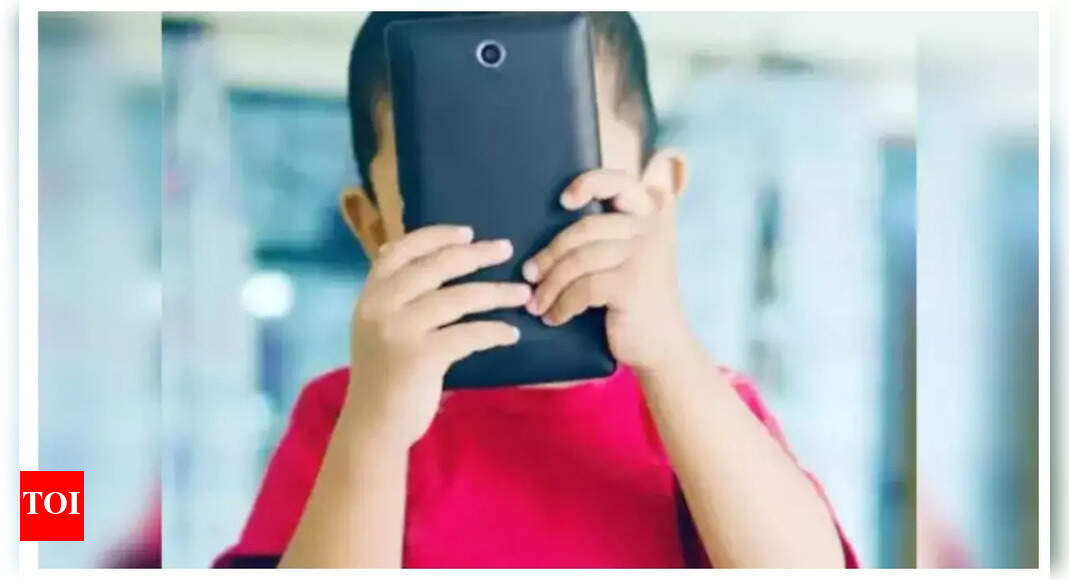Mental health struggles, aggression and low self-worth – 5 reasons why kids should not have smartphones before 13 | – Times of India

We can’t imagine our lives without our smartphones, but our kids are not far behind. Children, as young as 10, are seen glued to their smartphones, either playing games, or chatting with friends. But should young kids, especially those under 13, be given smartphones at such a nascent age? New global research says early smartphone use could quietly set kids up for more mental health struggles, as they get older. Here are 5 reasons why…
Poor mental health outcomes
Multiple international studies have found that children who receive their first smartphone before age 13, are significantly more likely to develop mental health concerns later. A 2025 study, published in the Journal of Human Development and Capabilities, and involving over 100,000 young adults, found a clear link: the earlier a child got a smartphone, the worse their mental health scores were by early adulthood.

Those who started using smartphones before 13, were more likely to report suicidal thoughts, aggression, lower self-worth, emotional regulation difficulties, and detachment from reality in their late teens and early 20s.
Greater risk of suicidal thoughts and aggression
One of the most alarming findings from recent research is the steep increase in suicidal thoughts among young adults, who received smartphones at a young age. For instance, one global study reports that nearly half of young women who got their first smartphone at age 5 or 6, later reported severe suicidal thoughts, compared to just over a quarter of those who got a smartphone after the age of 13. Among males, the same early group saw about 31% reporting such thoughts, versus 20% for those who got their phones at 13 or later.
Emotional struggles and low self-worth
The emotional impact of early smartphone use seems especially difficult for girls. Studies show that girls who had smartphones before age 13, had significantly lower self-worth, less emotional resilience, and more negative self-image as young adults. Boys, too, experienced lower confidence, less calmness, and less empathy.
Sleep, cyberbullying, and family stressors
If a child owns a smartphone at a young age, he/she will have much more access to social media. This can lead to cyberbullying, poor sleep, and even fights at home – all of which have been linked to mental health problems in later years.Sleep is especially affected: the light from screens, social notifications, and time spent browsing often disrupt natural sleep routines. Over time, this lack of restful sleep can worsen mood swings, attention problems, and stress.Cyberbullying is another major concern. Young children are often less able to deal with the harsh, sometimes cruel, world of online comments and messages, raising their risk of anxiety, low self-worth, and even thoughts of self-harm.
The longer the exposure, the greater the risk
What’s especially concerning is that the risks increase the younger the child is when they get a smartphone, and the longer they use one before age 13. One study’s “mind health score”, a measure of emotional, cognitive, and social well-being dropped from 30 for children who got a phone at 13, to just 1 for those who got a phone at age 5.These patterns held true across different countries, cultures, and backgrounds.

Why does early smartphone use cause these problems
Research suggests that early smartphone ownership is seldom just about calls and texts. For many kids, getting a smartphone also means early entry to social media and online communities that weren’t built with young brains in mind.Combined with less parental supervision, these factors can lead to:Early and unchecked exposure to harmful contentSocial comparison and pressureCyberbullyingDisrupted sleep from late-night scrollingLess face-to-face interaction and exerciseAll of these can damage healthy emotional and brain development.
What parents can do
Delay giving smartphones as long as possible, aiming for after age 13.Use parental controls and set limits on screen time and app access.Foster open conversations about cyberbullying, online safety, and mental health.Monitor family tech habits: kids model what their parents do.Encourage tech-free downtime for sleep, play, and real-life connection.
References
Journal of Human Development and Capabilities, Sapien Labs 2025CNN Health coverage on smartphone risks for kids under 13ABC News on global study of early smartphone use and mental healthPrairieCare & medical expert testimony on mental health impacts of early phone use
var _mfq = window._mfq || [];
_mfq.push([“setVariable”, “toi_titan”, window.location.href]);
!(function(f, b, e, v, n, t, s) {
function loadFBEvents(isFBCampaignActive) {
if (!isFBCampaignActive) {
return;
}
(function(f, b, e, v, n, t, s) {
if (f.fbq) return;
n = f.fbq = function() {
n.callMethod ? n.callMethod(…arguments) : n.queue.push(arguments);
};
if (!f._fbq) f._fbq = n;
n.push = n;
n.loaded = !0;
n.version = ‘2.0’;
n.queue = [];
t = b.createElement(e);
t.async = !0;
t.defer = !0;
t.src = v;
s = b.getElementsByTagName(e)[0];
s.parentNode.insertBefore(t, s);
})(f, b, e, ‘https://connect.facebook.net/en_US/fbevents.js’, n, t, s);
fbq(‘init’, ‘593671331875494’);
fbq(‘track’, ‘PageView’);
};
function loadGtagEvents(isGoogleCampaignActive) {
if (!isGoogleCampaignActive) {
return;
}
var id = document.getElementById(‘toi-plus-google-campaign’);
if (id) {
return;
}
(function(f, b, e, v, n, t, s) {
t = b.createElement(e);
t.async = !0;
t.defer = !0;
t.src = v;
t.id = ‘toi-plus-google-campaign’;
s = b.getElementsByTagName(e)[0];
s.parentNode.insertBefore(t, s);
})(f, b, e, ‘https://www.googletagmanager.com/gtag/js?id=AW-877820074’, n, t, s);
};
function loadSurvicateJs(allowedSurvicateSections = []){
const section = window.location.pathname.split(‘/’)[1]
const isHomePageAllowed = window.location.pathname === ‘/’ && allowedSurvicateSections.includes(‘homepage’)
const ifAllowedOnAllPages = allowedSurvicateSections && allowedSurvicateSections.includes(‘all’);
if(allowedSurvicateSections.includes(section) || isHomePageAllowed || ifAllowedOnAllPages){
(function(w) {
function setAttributes() {
var prime_user_status = window.isPrime ? ‘paid’ : ‘free’ ;
var geoLocation = window?.geoinfo?.CountryCode ? window?.geoinfo?.CountryCode : ‘IN’ ;
w._sva.setVisitorTraits({
toi_user_subscription_status : prime_user_status,
toi_user_geolocation : geoLocation
});
}
if (w._sva && w._sva.setVisitorTraits) {
setAttributes();
} else {
w.addEventListener(“SurvicateReady”, setAttributes);
}
var s = document.createElement(‘script’);
s.src=”https://survey.survicate.com/workspaces/0be6ae9845d14a7c8ff08a7a00bd9b21/web_surveys.js”;
s.async = true;
var e = document.getElementsByTagName(‘script’)[0];
e.parentNode.insertBefore(s, e);
})(window);
}
}
window.TimesApps = window.TimesApps || {};
var TimesApps = window.TimesApps;
TimesApps.toiPlusEvents = function(config) {
var isConfigAvailable = “toiplus_site_settings” in f && “isFBCampaignActive” in f.toiplus_site_settings && “isGoogleCampaignActive” in f.toiplus_site_settings;
var isPrimeUser = window.isPrime;
var isPrimeUserLayout = window.isPrimeUserLayout;
if (isConfigAvailable && !isPrimeUser) {
loadGtagEvents(f.toiplus_site_settings.isGoogleCampaignActive);
loadFBEvents(f.toiplus_site_settings.isFBCampaignActive);
loadSurvicateJs(f.toiplus_site_settings.allowedSurvicateSections);
} else {
var JarvisUrl=”https://jarvis.indiatimes.com/v1/feeds/toi_plus/site_settings/643526e21443833f0c454615?db_env=published”;
window.getFromClient(JarvisUrl, function(config){
if (config) {
const allowedSectionSuricate = (isPrimeUserLayout) ? config?.allowedSurvicatePrimeSections : config?.allowedSurvicateSections
loadGtagEvents(config?.isGoogleCampaignActive);
loadFBEvents(config?.isFBCampaignActive);
loadSurvicateJs(allowedSectionSuricate);
}
})
}
};
})(
window,
document,
‘script’,
);
[title_words_as_hashtags



